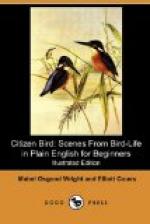[Illustration: Mockingbird.]
“Dey uster have a song ‘bout de Mockers roun’ de cabins, an’ a dance went wid it, ’cause it was a berry long song; but aftah dat Sambo done change it some when he uster sing it.”
Mammy then chanted a verse, keeping time by beating her hands on her knees.
“De sugar-cane hits pushin’
in de bottoms,
De rice hits a-sproutin’
now fo’ shore!
De cotton hits a-greenin’ in de
furrer,
An’ honey I’se
a-waitin’ at de door!
“Did I tole you dat I know’d
whar dere’s a possum?
Did I tole you dat I
know’d whar dere’s a coon?
Oh, mah lady, come out soon!
Oh, mah honey, come out soon!
While de Mocker, while
de Mocker
Am a-singin’ to
de moon!”
Suddenly mammy jumped up, and waving the children off, started for the house as fast as she could trot, muttering to herself.
“What is the matter?” called Olive; “has a bee stung you?”
“No, nope chile, but t’inkin’ ‘bout dem times I done forgit I lef’ a big pan o’ buns a-risin’ foh yoh lunch. Like’s not dey’s rised till dey’s bust an’ popped over!” And mammy disappeared amid a chorus of laughter.
“What mammy has said about the Mockingbird in his summer home is true. As a visitor who sometimes stays and builds, he strays east and north as far as Massachusetts, and westward to Colorado and California. If he were not a hardy bird who sometimes raises three broods a year, I’m afraid the race would come to an end, because so many nestlings are taken each year and sold for cage birds.”
The Mockingbird
Length about ten inches.
Upper parts gray, but dusky-brownish on the wings, which have a large white spot. Three white feathers on each side of the tail, which is blackish. The males, who sing, have more white on the wings and tail than the females, who are songless.
Under parts whitish.
Sings his own true song, a rapid, sweet melody, heard best after twilight; but has many comic songs of whatever nonsense comes into his head.
A Citizen of the southern United States, often straying
northward to New
England.
A Ground Gleaner, Tree Trapper, and Seed Sower.
THE CATBIRD
When the Doctor said “Catbird” the children began to imitate the various calls this famous garden bird utters, for by this time they were familiar with all his tricks and manners. Some of the imitations were very good indeed, if not musical. “Miou! Zeay! Zeay!”




